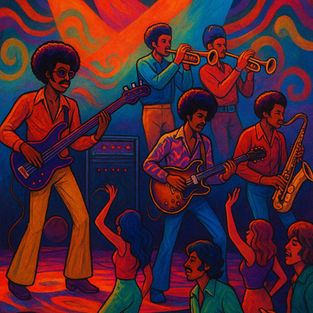
Photo- AI Generated
Reggae's Global Journey: From Jamaica to the World
In the heart and soul of 1970s Jamaica, a sound arose from the streets of Kingston, saturated with struggle, energy, and identity.
14 July 2025
What began as music from a small Caribbean island swiftly grew into a revolutionary global force. Reggae surged beyond Jamaica's shores in the 1970s, becoming a medium for cultural expression, political opposition, and spiritual enlightenment, forever transforming the global musical scene.
The Roots of Rhythm
Reggae did not emerge suddenly. It arose from the rhythmic growth of earlier Jamaican genres such as ska and rocksteady. By the late 1960s, artists had begun to slow down the tempo, emphasise the offbeat, and use deeper basslines. These upheavals gave rise to reggae, a sound that pounded like the people's heartbeat.
It was music created for and by the community, honest, authentic, and anchored in lived experience. While ska and rocksteady had previously made their way into dancehalls, reggae introduced something new: consciousness.
The Rise of Bob Marley and The Wailers
No assessment of reggae's global significance in the 1970s is complete without mentioning Bob Marley. Marley and his band, The Wailers, transformed Trenchtown's sound into an international movement. Albums like Catch a Fire (1973), Rastaman Vibration (1976), and Exodus (1977) established Marley as a global icon and the first true global celebrity to emerge from the Caribbean.
However, Marley was doing more than just generating songs; he was also conveying messages. Songs like "Get Up, Stand Up," "No Woman, No Cry," and "Redemption Song" were more than just anthems; they were calls to action for justice, resistance, and optimism.
Rastafarianism, a spiritual and political concept inextricably linked to reggae, was initially introduced to the globe by Marley. The dreadlocks, red-gold-green, ganja, and reverence for Ethiopia and Haile Selassie were all part of a bigger worldview that reggae spread all over the world.
Island Sound Goes Global.
By the mid-1970s, reggae had spread beyond Jamaica. Reggae music was widely diffused around the world thanks to labels such as Island Records. The genre grew popular in the United Kingdom, particularly among the country's rising population of Caribbean immigrants. The underground in London was alive with bass-heavy sound systems, and performers like Steel Pulse, Aswad, and Linton Kwesi Johnson added a uniquely British twist to reggae's lyrics of resistance and pride.
Even in the United States, reggae began to enter the mainstream. Eric Clapton's 1974 cover of Marley's "I Shot the Sheriff" introduced the sound to rock radio, and it subsequently impacted punk, hip-hop, and pop performers.
Meanwhile, in Jamaica, Toots and the Maytals, Burning Spear, Peter Tosh, and Jimmy Cliff continued to push reggae's creative frontiers by incorporating gospel, funk, and aggressive political fire.
Dub, Dancehall, and Innovation.
The late 1970s also saw the emergence of dub, an experimental subset of reggae that emphasised stripped-down instrumentals, echo, and reverb. Producers such as King Tubby, Lee "Scratch" Perry, and Scientist turned the mixing console into a standalone instrument, setting the framework for future genres such as electronic, hip-hop, and even lo-fi.
As the decade came to a close, the groundwork was being built for dancehall, reggae's grittier, faster sister who would take over the 1980s. However, even as new forms arose, the essence of roots reggae remained eternal.
A Cultural and Political Force.
Reggae was more than music; it was a movement. In apartheid-era South Africa, it became the soundtrack of resistance. In Latin America, it sparked political activism. In Asia, it was incorporated into local traditions and remixed into something entirely new. Reggae provided Black communities worldwide with a cultural identity that was both anchored and global.
By the end of the 1970s, reggae had transformed not only the sound of global music but also the way music could impact society.
Reggae in the ’70s: A Global Awakening
The 1970s were the decade when reggae truly became global. From the streets of Kingston to the punk clubs of London, the college dorms of America, and beyond, reggae travelled on rhythms, ideas, and revolutionary love.
It wasn’t just music. It was a message. And that message — of resistance, of unity, of soul—still echoes today in genres and artists that may not even realise the roots beneath their sound trace back to Jamaica’s vibrant, rebel heartbeat.









